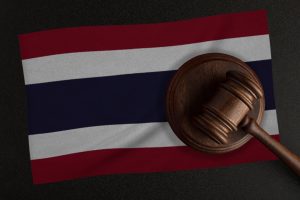A Thai court yesterday authorized the deportation of an ethnic minority activist to Vietnam, where he faces up to a decade in prison on terrorism charges.
Y Quynh Bdap was arrested by immigration police on June 11, and is currently being held at Bangkok Remand Prison in the Thai capital. The 32-year-old has been living in Thailand since 2018 and has been recognized as a refugee by the United Nations refugee agency UNHCR.
The Vietnamese government has requested Bdap’s extradition in connection with last year’s attacks on two government offices in Dak Lak province in the Central Highlands. The attacks, which occurred in the early hours of June 11 in Cu Kuin district, left nine people dead, including four police officers, two commune officials, and three civilians.
According to a report by Radio Free Asia (RFA), a judge at the Bangkok Criminal Court said there were sufficient grounds to approve the Vietnamese government’s extradition request. “It is up to the government to execute the extradition in 90 days regardless of the court ruling,” the judge said during a hearing yesterday.
The judge added that Bdap has 30 days to appeal the case and must be set free if he has not been extradited within 90 days, RFA reported.
Bdap was one of 100 individuals arrested in connection with the Dak Lak attacks, who were tried en masse over four days in January. At the conclusion of the trial, 10 were sentenced to life in prison on terrorism charges, with the remainder handed prison sentences ranging from three-and-a-half years to 20 years.
Bdap is the co-founder of Montagnards Stand for Justice, which campaigns for political and religious freedom for the Montagnards, a label that includes the various ethnic minority groups living in Vietnam’s Central Highlands. Despite being outside the country, Bdap was accused of helping foment the attack in Dak Lak and was sentenced to 10 years in prison in absentia. He has denied any involvement.
According to the Associated Press, Bdap is currently seeking asylum in Canada and “had a meeting with Canadian Embassy officials in Bangkok the day before he was taken into custody.”
While Bdap’s lawyers plan to appeal the case, yesterday’s ruling affirms the fears of many rights activists, who have warned that being extradited to Vietnam would place the activist in “grave danger.”
The ruling also speaks to a worrying trend in Thai policy. For decades, Thailand has served as an informal sanctuary for political exiles from across Southeast Asia, particularly Myanmar, Thailand, Vietnam, China, and Laos. But Bangkok has showed an increasing willingness to detain and deport dissidents from foreign countries, on the expectation that they will reciprocate by doing the same for Thai exiles who fled abroad after the 2014 coup. In a report published earlier this year, the advocacy group Human Rights Watch HRW described this quid pro quo arrangement as a “swap mart” of refugees and dissidents. In a post on X, Greg Raymond of the Australian National University described the Mekong nations as an “authoritarian security community.”
For instance, Thai authorities have arrested and deported dozens of Cambodian dissident refugees in recent years, some of whom have faced arrest and mistreatment on their return. Most recently, in February of this year, Thai authorities arrested three exiled Cambodian political activists in Thailand, ahead of a state visit by Prime Minister Hun Manet. The three activists appear to remain in Thai custody.
This trend could be reversed somewhat by Thailand’s Act on Prevention and Suppression of Torture and Enforced Disappearances. The law, which was passed in August 2022 and came into effect in February of this year after years of advocacy by NGOs, prohibits the deportation or extradition of any person who could face “torture, cruel, inhuman, or degrading treatment, or enforced disappearance.”
As I wrote at the time of Bdap’s arrest, his case offers a test of the law, and whether it will restrain the increased extradition of exiles. Based on yesterday’s ruling, the outlook for the region’s dissenters is not positive.

































